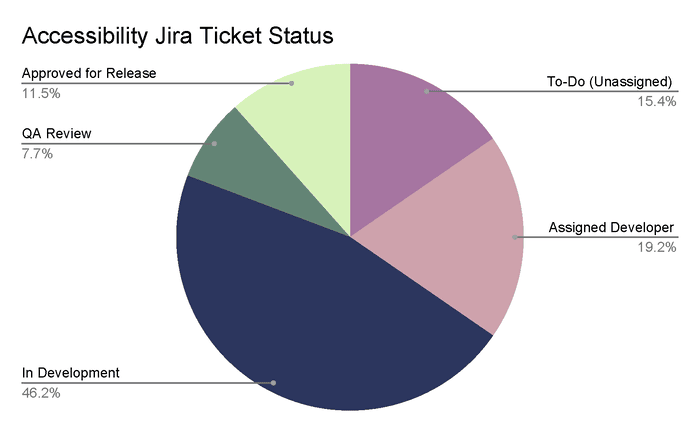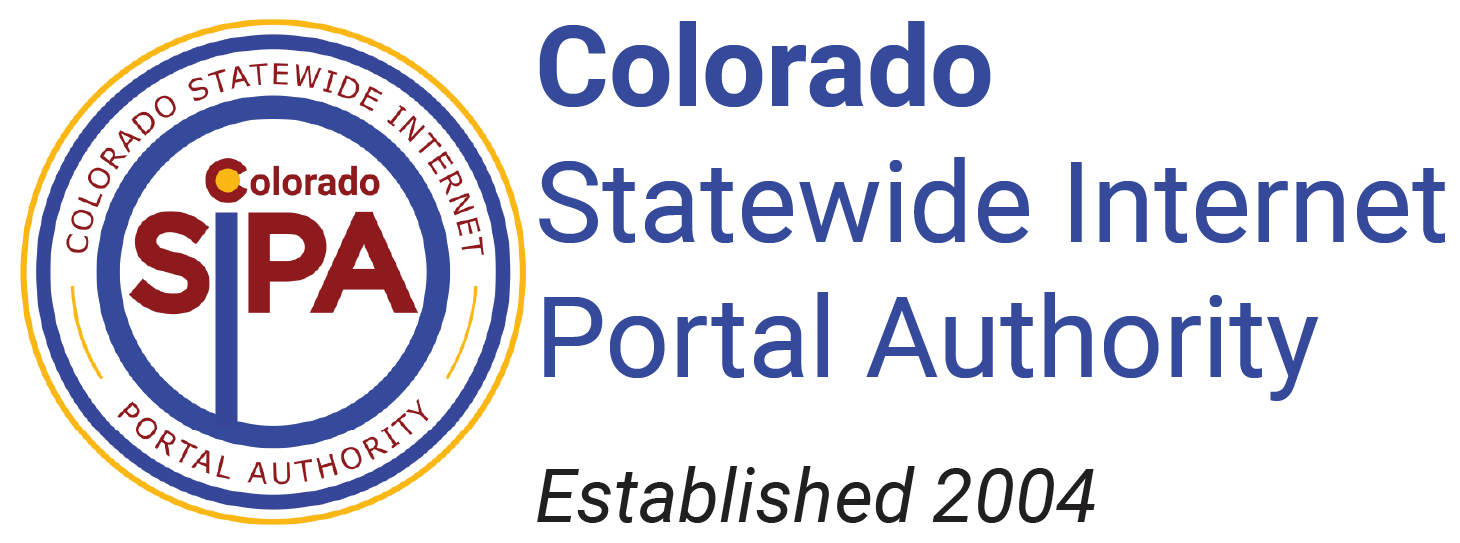Quarterly Accessibility Program Status Update, April 2025
Executive Summary
In the first quarter of 2025, SIPA focused heavily on making existing digital resources more accessible, both on the Colorado.gov CMS platform and on SIPA’s websites.
With hundreds of Colorado government websites operating on the Colorado.gov platform, ensuring the accessibility of government websites throughout the state is a top priority for SIPA. The CMS platform is currently undergoing substantial development work related to meeting WCAG 2.1 AA conformance before the July 1, 2025 deadline of HB24-1454. Multiple CMS platform releases will occur in April and May that are expected to substantially improve the accessibility of the CMS platform.
Over the past quarter, SIPA has remediated several webpages and documents hosted on the agency website. SIPA websites are currently on track to meet accessibility technical standards by July 1, 2025. Ensuring the accessibility of YouTube videos has been particularly challenging, however meaningful progress has been made and continues to advance.
A SIPA employee training program was initiated in January 2025 and will consist of approximately 10-12 hours of instructor-led accessibility training over the next calendar year, delivered in group based virtual-training sessions. Topics and depth of subject matter are tailored to the current needs and abilities of the employee group.
Evaluation
Colorado.gov CMS Platform
All documented accessibility issues on the CMS platform have been evaluated and prioritized in collaborative sessions between Tyler Technology's program manager and SIPA's digital accessibility specialist. Numerous duplicate tickets were clarified or consolidated and several obsolete tickets were removed, thereby improving data quality of accessibility tickets within the helpdesk system.
In the interest of transparency, SIPA routinely provides status updates to state agencies upon request. Although state agencies and local government customers do not have visibility into Tyler's helpdesk system, SIPA regularly provides information and insights to CMS customers upon request
SIPA regularly assists local government customers with their website accessibility needs by providing subject matter expertise and thoughtful guidance. Any customer may reach out to SIPA with questions and schedule a strategy consultation with SIPA’s digital accessibility specialist or ask specific technical questions relating to the accessibility standards or Colorado law.
SIPA 2025 User Conference
Additional locations for the 2025 SIPA User Conference were visited by SIPA staff and evaluated for inherent accessibility problems. All potential locations have been ranked for accessibility, which will be considered as a factor in the selection process. SIPA leadership is currently considering available locations and will make a decision soon.
SIPA has evaluated conference management software to ensure that any app used for the 2025 User Conference is accessible for attendees. One app was rejected based on manual testing, and another app was tentatively approved based on VPAT information.
Remediation of Digital Assets
Colorado.gov CMS Platform
Tyler Technologies has recently engaged with contract Drupal developers to remediate several accessibility issues on the Colorado.gov platform. SIPA is currently closely working with these groups to improve the overall accessibility of the CMS platform. Through multiple weekly meetings, SIPA is able to advise and offer technical recommendations on accessibility issues. The updates produced by Tyler's developers and contractors will be delivered through a series of bi-monthly software releases beginning in mid-April. We expect that these releases will address some of the most severe and widespread accessibility issues impacting the CMS platform. SIPA is currently participating in user acceptance testing for these release cycles.
Of the 52 critical accessibility issues currently being tracked by SIPA, several are currently either in development, being reviewed for quality, or are approved for release. A user-acceptance testing session, with state employees reviewing changes, will be completed prior to software updates being released.
| Status | Count | Percent of Total |
|---|---|---|
| To-Do (Unassigned) | 8 | 15.40% |
| Assigned Developer | 10 | 19.20% |
| In Development | 24 | 46.20% |
| QA Review | 4 | 7.70% |
| Approved for Release | 6 | 11.50% |

SIPA Website
Numerous documents on the SIPA website have been remediated for accessibility, and SIPA is well on track to have all documents within compliance by July 1, 2025, with only a small number of non-compliant documents remaining that are currently being converted to HTML versions.
Substantial effort has been devoted to ensuring that SIPA's web-based forms have been made as accessible as possible. SIPA has implemented custom CSS and JavaScript code on 13 different web forms to improve their accessibility. These accessibility improvements include overcoming platform-specific limitations of the form providers.
YouTube Videos
With the ongoing creation of video-based content, accessibility of YouTube videos has presented a unique challenge for SIPA. In Q1 of 2025, processes were created and tools procured to allow for the in-house creation of high-quality, accurate, and human-reviewed captions for all YouTube content produced by SIPA.
All future video content that SIPA creates will be captioned appropriately. All videos from the past year, as well as those linked from the agency website, have captioned appropriately. Efforts to add high-quality captions to older video content are ongoing.
SIPA is currently reviewing available options for creating audio descriptions and attempting to find accurate and cost-effective solutions that meet WCAG level AA conformance. Possibilities include engaging with third-party vendors to create audio descriptions, or possibly creating audio descriptions in-house using the Google Cloud text-to-speech API.
Intranet
All internal intranet pages have been reviewed for accessibility. An initial pass at remediation has been made, but further accessibility improvements are still possible. While most pages are generally accessible or have been substantially improved, the intranet platform (Google Sites) continues to present inherent accessibility issues that cannot be entirely remediated. These issues have been deemed to be acceptable in the immediate-term while other issues of potentially greater severity and impact are being addressed.
An additional remediation sprint should be planned in the future to address content linked from intranet pages that has not been evaluated and may not be entirely accessible.
Employee Training
In January 2025, SIPA began an internally driven accessibility training program for employees. The program is currently managed by SIPA’s digital accessibility specialist, who develops and delivers training sessions to staff.
SIPA employees have so far received two accessibility training sessions: one on Google Docs and another on creating accessible spreadsheets in Excel and Google Sheets. Each of these sessions were approximately one hour in length.
Training sessions are scheduled several times per year, as resources permit. The current target is approximately 10-12 sessions per year. The next accessibility training session for SIPA employees is currently in development and will focus on creating and delivering accessible presentations using Google Slides.
Additionally, SIPA’s accessibility specialist is available on-demand to provide personalized accessibility support and guidance to SIPA employees.
